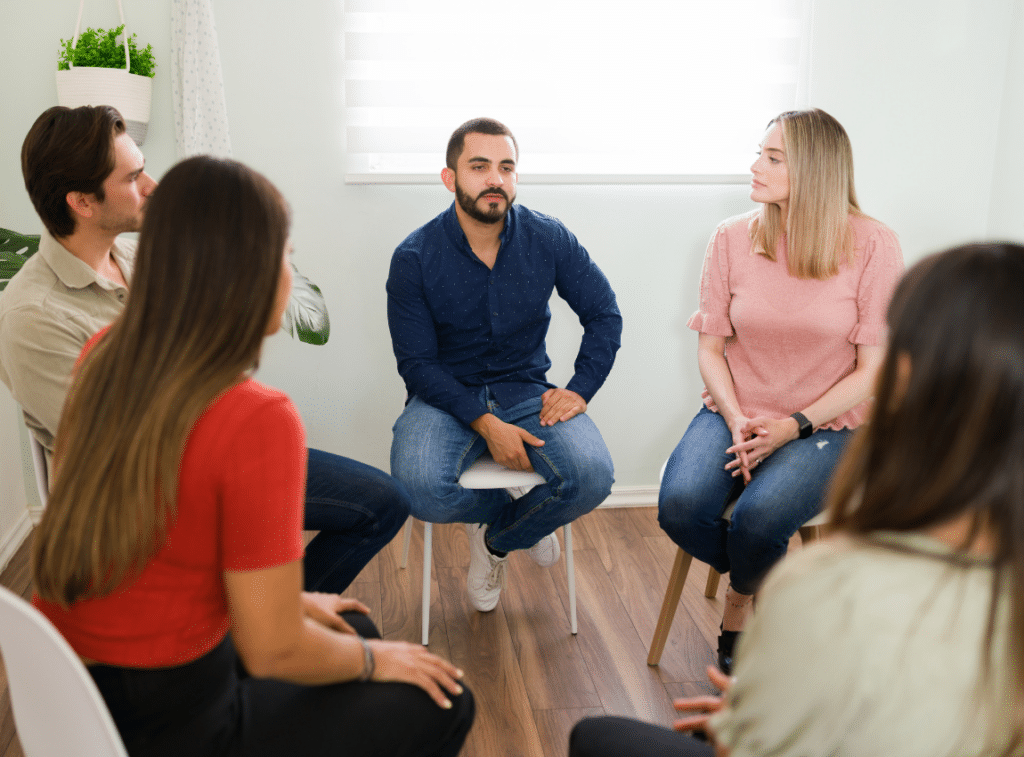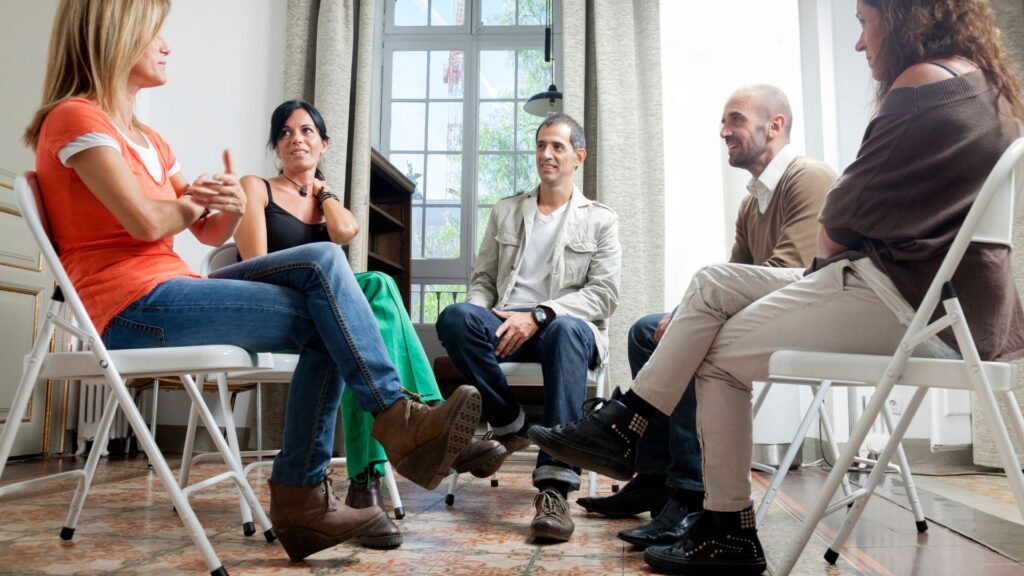Life Skills Training
When recovering from an addiction or mental health condition, rebuilding your life skills will be an essential part of the recovery process. As you learn to navigate a life of sobriety, having essential life skills will make this journey much easier.
Life skills are abilities that enable us to effectively handle the demands and challenges of life. They are the skills we need to live healthy, productive, and fulfilling lives, even in the face of hardship and turmoil.

What Are Life Skills?
There are usually four categories into which life skills can be divided. These include:
- Personal skills: These skills help us to manage ourselves and our lives. They include skills such as self-awareness, self-management, and resilience.
- Interpersonal skills: These skills help us to interact with others effectively. They include skills such as communication, teamwork, and conflict resolution.
- Practical skills: These skills help us to think critically and solve problems. They include skills such as critical thinking, problem-solving, and decision-making.
- Emotional skills: These skills help us to recognize, express, and regulate our emotions. Emotional skills provide a foundation for self-awareness and good mental health.
Why Are Life Skills Important?
Addiction and mental illness can have a devastating impact on our lives, severing relationships, careers, dreams, and overall well-being. As these conditions take their toll on your physical and mental health, your basic life skills begin to deteriorate as well.
Saying that life skills are important in recovery and understanding why this is so are quite different. There are many reasons why re-learning life skills is important while you are recovering from these disorders.
Some of the benefits that come with obtaining these skills include:
- Develop and maintain healthy relationships: Addiction can damage relationships with family, friends, and romantic partners. People in recovery need to learn how to communicate effectively, resolve conflict, and build trust in order to repair and maintain these relationships.
- Manage stress and emotions: Stress and negative emotions can be triggers for relapse. People in recovery need to learn healthy coping mechanisms for dealing with these challenges. This may include things like exercise, relaxation techniques, and journaling.
- Enhanced decision-making: People in recovery need to be able to make good choices about their physical and mental health, as well as their finances and careers. This includes things like choosing healthy foods, getting enough sleep, and avoiding situations that may lead to relapse.
- Improved problem-solving skills: Running into roadblocks and hardships during the recovery process is almost guaranteed. Knowing how to approach these problems and effectively handle them can help you avoid relapse during your recovery.
- Reintegration into society: Recovery is not just about staying sober. It is also about living a happy and fulfilling life. People in recovery need to develop life skills that will help them achieve their goals and dreams, including abilities such as time management, goal setting, and problem-solving skills.
In short, life skills are essential for recovery because they can help you develop the tools and resources you need to stay sober and live a fulfilling life. Of course, now that you understand the benefits of life skills, it is important to know what to expect when you participate in this type of training.
What Is Life Skills Training?
Life skills training can be provided in a variety of settings, including schools, community centers, workplaces, and, of course, rehabilitation programs. They can be taught in a group setting or individually and are most effective when tailored to the specific needs of the individual.
Life skills training is important for people of all ages – especially amongst youths -as this training can help them to develop the skills they need to make healthy choices and to succeed in school, work, and life. Building life skills can have a number of benefits for individuals and society as a whole.

- Increased self-confidence and self-esteem
- Improved decision-making skills
- Reduced risk of engaging in risky behaviors
- Improved academic and employment achievements
- Improved health and well-being
- Reduced crime rates and social costs
How Does Life Skills Training Work?
Typically, life skills training programs begin by identifying the specific skills that you need to develop. This may be done through individual assessments or group discussions. Once your needs have been identified, the program can be tailored to address them.
Life skills training programs typically use a combination of teaching methods, including:
- Instruction: You will learn about the skills they need to develop through lectures, demonstrations, and other forms of instruction.
- Demonstration: You will be able to see the skills being demonstrated by instructors or other trained individuals.
- Feedback: You will receive feedback on your performance from instructors or peers. This helps you to identify areas where you are doing well and where you need to improve.
- Reinforcement: You will be rewarded for your efforts to learn and use the skills you are learning as you adapt and develop them.
- Practice: You will have opportunities to practice the skills you are learning in a safe and supportive environment.
Life skills training programs also often include opportunities for you to apply the skills you are learning to real-world situations. This may involve role-playing exercises, simulations, or community service projects.
Tips for Successful Life Skills Training
It is important to keep in mind that these training programs are a two-way effort. In order to effectively learn and develop these life skills, it is important to actively participate and make an effort in your training.
Some tips you can keep in mind to ensure a successful training process including:
Making your training relevant
You are more likely to be engaged and learn effectively if the training is relevant to your life and needs. Consider the specific challenges and opportunities that you are facing, and tailor your training accordingly.
Staying interactive
Life skills are best learned by doing. It is important to take advantage of opportunities to practice the skills you are learning through activities, role-playing, and simulations.
Listening to feedback
Feedback is essential for learning and growth. Actively listening to and accepting regular feedback on your performance can help you identify your strengths and areas for improvement.
Finding a supportive environment
You should feel comfortable asking questions and making mistakes. Finding a supportive learning environment where you feel respected and valued is crucial for successfully building these new skills.
Being patient
Learning new skills takes time and effort. Be patient with yourself and take time to celebrate your progress along the way.
As with any type of addiction treatment, this period can be an unfamiliar and uncomfortable time. But, with the right support and mindset, you can achieve long-term recovery and develop the skills you need to live a happier, healthier life.
Life Skills Training at South Coast
At South Coast Behavioral Health, we believe that the recovery process should address all aspects of a person’s substance use or mental health disorder, including the impacts these conditions have on one’s ability to maintain a healthy, balanced lifestyle.
This is why our treatment approach incorporates life skills training to ensure that you are able to practically re-adjust to society after your recovery period. While it is possible to teach yourself basic life skills, getting help from a professional therapist or treatment center such as ours can ensure that you are able to successfully implement these skills in your day-to-day life.
We provide the support and guidance you need to learn effective life skills and gain the confidence to channel them into maintaining an independent, sober lifestyle. In addition to life skills training, our treatment approach offers a full continuum of care designed to address each aspect of your behavioral disorder, including:
- Medical detox
- Residential treatment
- Partial hospitalization
- Intensive outpatient treatment
- Evidence-based and holistic therapies
No matter what your specific needs may be, our facilities are equipped to address each and every one of them. If you want to learn more about how our program can help you or are ready to start your recovery, reach out to us or fill out one of our secure contact forms today!
Get A Confidential Assessment From A Recovery Specialist
Life Skills Training in Orange County, CA
If you are struggling with a mental health or substance use disorder, life skills training may be an effective treatment option for you. It is important to note that group sessions require active participation in order for them to be successful. If you think life skills training might be right for you, please reach out to us today!
We provide life skills training for men within our medical detox and residential treatment centers in Irvine, CA.
We offer life skills training for women at our medical detox and residential treatment centers in Huntington Beach, CA.
We provide life skills training for men within our residential inpatient facility in Costa Mesa, CA.
We provide group therapy during our PHP and IOP programs in Newport Beach, CA.
Along with life skills training our treatment centers in California offer a wide range of services and dedicated addiction specialists who will help you begin your journey. We believe in empowering real people to get real, lasting results in recovery.


